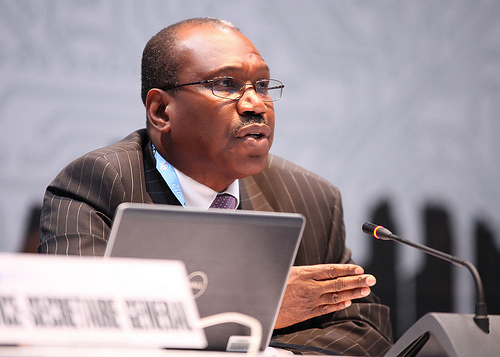The director general of the International Telecommunication Union today spoke of his surprise and disappointment with the U.S., UK and other nations walking out of a vote to approve a new UN telecoms treaty, the first update to international regulation of the industry in 24 years. The treaty has been charged with controversy over questions of how it would approach Internet provisioning and freedom of speech, with several parties weighing in before and during the UN meeting in Dubai to make their positions known.
“Yesterday we met twice,” director general Hamadoun Toure (pictured left) said today in the ITU’s first post-vote press conference. “I couldn’t imagine they wouldn’t sign it. I especially was surprised by the reasons that were put in place. I had made it clear from the opening that [Internet and content were not a part of the discussion]. I invited ICANN to show that we want to build bridges. The telecoms society and internet society need to work together. I made an appeal to please help us build bridges. The fighting will not help the consumer that we are trying to reach here.” He later noted repeatedly that Internet and content were not part of the discussion.
The key bone of contention has centered around whether countries would be able to control how the Internet could be used in their countries. Another related issue here has been about the involvement of other groups in how things get decided: although the ITU invited several groups, like ICANN, to contribute their views, and companies like Google had three delegates at the confab this week, ultimately the votes are cast by nations.
“It’s with a heavy heart and a sense of missed opportunity that the U.S. must communicate that it’s not able to sign the agreement in its current form,” the U.S. delegation said in a statement at the plenary after the final changes were adopted last night. “We candidly cannot support an ITU treaty that is inconsistent with the multi-stakeholder model.
The ITU has tried to steer clear of these discussions, emphasizing that the treaty simply does not engage at that level. It covers instead issues like international roaming, provisioning broadband for less advantaged people and fighting spam.
The third of these has been the focus for dissenting countries, which believe that it could be used by countries as a lever to block whatever kind of content or service they deem as “spam.” Specifically, the worry is that “firewalls” put up by the likes of China to block certain content deemed to be against the state would be implicitly alright.
Toure himself also disengaged from that charged, more political conversation today. “We’ve never dealt with political issues and we don’t intend to do so,” he said. “As we like to say, technical problems have technical solutions, political problems have political solutions.”
Mohamed Nasser Al-Ghanim, chairman of the World Conference on International Telecommunications, added: “We have put special provisions [into the treaty] to say that content is excluded. The internet will continue as it has. I believe that [states] who are not wishing to sign this will deprive their citizens of many good things that are coming out of this treaty.
“We are clearly stating that nothing should impact [freedom of speech],” he continued. “It was clear to anyone who was reading the document. Read the treaty before making comments. There is a lot that is not in there, but what is in there is good.”
To me, it’s hard to say yet whether the UN treaty is, in the words of the U.S. delegation, a missed opportunity to effect more reforms, or the beginning of a new kind of digital divide. That is, when it comes down to it, whether the priorities of more developed economies — promoting how the Internet gets used — are just simply different from those of smaller or poorer countries — who are more concerned with questions of basic access — and whether it makes sense to try to cover them in a singular kind of framework.
At least where today’s vote was concerned, the emphasis was on the latter of these groups.
“The treaty that has been signed today will make it possible that the remaining billions of people without telecoms access and are offline,” Toure noted. “The people signing this treaty are the majority of countries that need it most.
“The US is a very advanced country, but… in developing countries, our goal is a connected society. This treaty will open the door for access, use and sharing.”
The treaty takes effect on January 1, 2015. The ITU noted that there were 152 nations participating in Dubai, with 140 of them having “the right credentials to sign” the treaty. The 15-20 countries that have said either they would not sign or postpone signing can now take the treaties to their own governments for approval, or continue to be subject to the older rules from 1988.
Image: Flickr
